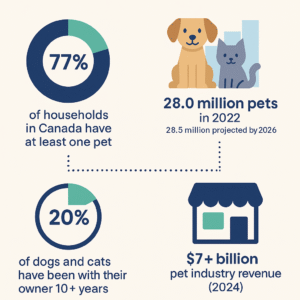Economic uncertainty makes it essential to choose a business model that is stable and resilient. For pet lovers looking to turn their passion into a career, dog training franchises, like Bark Busters, offer a compelling opportunity. But is this business truly recession-proof?
The answer lies in the steady demand for pet services, the growth of pet ownership in Canada, and the unique structure of Bark Busters’ franchise model.
With nearly 80% of Canadian households owning at least one pet, and over half having a cat, dog, or both, the demand for professional dog training remains strong even in challenging economic times.
Why Dog Training Franchises Are Resilient
Pet ownership is an essential part of many Canadians’ lives. Even during economic downturns, owners prioritize their pets’ health, behaviour, and well-being. Professional dog training is not a luxury; many households view it as a necessary service to ensure safety, obedience, and a harmonious home environment.
Bark Busters franchises are particularly resilient because they offer:
• Essential, high-demand services: Behavioural training and in-home support for dogs remain a priority regardless of economic shifts.
• Home-based operations: No expensive retail space or staff overhead, lowering operational risk.
• Flexibility: Franchisees can manage their schedules, target local demand, and adapt offerings as needed.
Pet Ownership Trends in Canada
Understanding Canadian pet trends provides insight into why dog training remains a strong, recession-resistant business. Key statistics include:
• Almost 80% of Canadian households have at least one pet, with dogs present in 39% of homes and cats in 37%.
• In 2022, there were over 28 million pets in Canada, with numbers projected to rise to 28.5 million by 2026.
• Approximately 20% of dogs and cats have been with their owner for ten years or longer, showing the long-term commitment Canadians have to their pets.
• The pet industry in Canada is growing, with revenue expected to reach over $7 billion in 2026, highlighting the economic significance of the sector.
These statistics illustrate a market that is large, growing, and stable, providing a solid foundation for dog training franchises like Bark Busters.
Bark Busters’ Proven Franchise Model
Bark Busters’ franchise system is structured for stability and success, making it well-suited to withstand economic downturns:
• Home-based model: Franchisees provide in-home dog training, eliminating costly retail operations.
• Low overhead: Focus is on services rather than large fixed costs.
• Established brand: Over 35 years of experience and a network of more than 20 trainers across Canada.
• Comprehensive support: Initial training, ongoing mentorship, and operational guidance reduce risk for first-time business owners.
This structure allows Bark Busters franchisees to maintain profitability even during economic slowdowns, as the business relies on essential, high-demand services rather than discretionary spending.
Key Factors Supporting Franchise Stability
Several factors make Bark Busters franchises resilient:
• Recurring demand: Behavioural issues, puppy training, and in-home consultations are ongoing needs for dog owners.
• Multiple revenue streams: Services include puppy training, behavioural consultations, and ongoing dog support programs.
• Adaptable to local markets: Franchisees can target areas with high dog ownership and adjust offerings to suit community needs.
• Low-risk model: In-home services reduce operational costs and allow flexibility in scaling.
• National brand recognition: Provides trust and credibility that attracts clients even during economic uncertainty.
These factors create a business model that is stable, flexible, and profitable, even in recessionary conditions.
Local Market Considerations
While Bark Busters benefits from national recognition, franchisees also need to consider local market conditions. High-density urban areas, family-oriented suburbs, and regions with high dog ownership tend to have strong demand for in-home dog training. Franchisees can leverage local SEO, community events, and partnerships with pet services to grow their client base.
Even in smaller communities, the home-based model allows efficient territory coverage, ensuring accessibility and repeat clients without the overhead of a physical store.
Conclusion
In summary, Bark Busters dog training franchises are well-positioned to withstand economic fluctuations. The combination of:
• High demand for essential dog training services
• A growing pet population in Canada (over 28 million pets and counting)
• Low-overhead, home-based operations
• Proven national brand recognition
…makes this franchise a stable and resilient business opportunity.
For those passionate about dogs and seeking a sustainable career, Bark Busters Canada offers a proven franchise model with ongoing support, low risk, and access to a market that continues to grow—even in uncertain economic times. Become a trainer today!
FAQs
Q: Is a dog training franchise really recession-proof?
A: While no business is entirely immune to economic downturns, Bark Busters franchises are highly resilient due to the essential nature of pet services and steady demand from Canadian pet owners.
Q: How many households in Canada own dogs?
A: Around 39% of Canadian households have a dog, representing millions of potential clients for dog training services.
Q: What makes Bark Busters different from other franchises?
A: Bark Busters provides in-home training, extensive franchisee support, low overhead, and a well-established national brand recognized for over 35 years.
Q: Can first-time business owners succeed with a Bark Busters franchise?
A: Yes! Bark Busters offers comprehensive training in dog behaviour, client management, and business operations, making it accessible for new entrepreneurs.
Q: Are Bark Busters franchises available across Canada?
A: Yes! With over 20 trainers nationwide, Bark Busters offers franchise opportunities in multiple provinces, supported by localized marketing and operational guidance.





